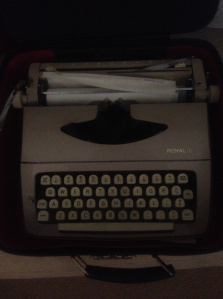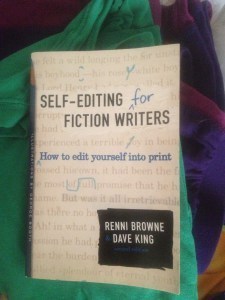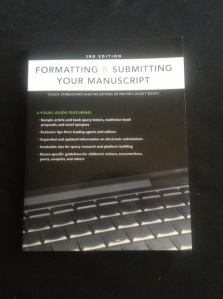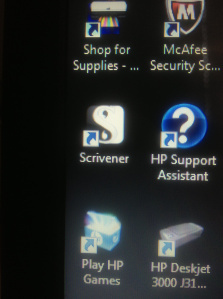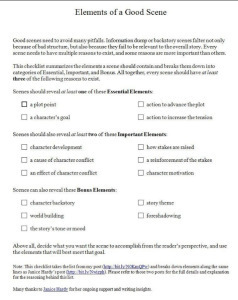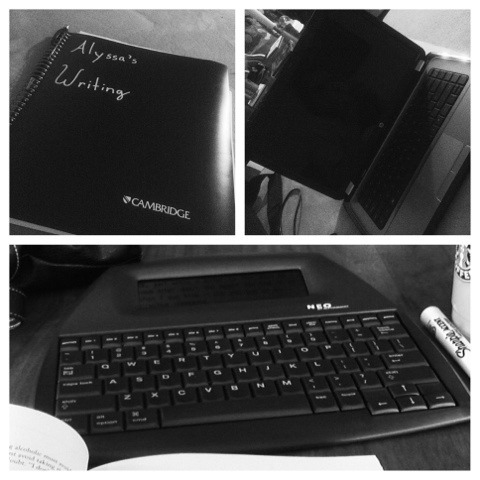Alyssa Hubbard's Blog, page 22
May 21, 2013
Writing Resources
After my editing post and receiving so much feedback, I have decided to dedicate a post to the resources which I use to write, but, in writing this I also came up with a new editing technique I will be sharing with everyone on Friday. It is one that I have paired alongside my original technique, which is something everyone can do if they wish to incorporate this technique into their own techniques. I will be hinting at it occasionally in this post, but details will come along on Friday. Now, onto my resources (with pictures, of course)!
A Typewriter
They’re old, yes, and they do not have word counters or the fancy spell checks, but they were once used to write thousands upon thousands of manuscripts. Unless you get one of the newer models, which are essentially retro computers. I wouldn’t personally want one because to me it loses the value an old school typewriter has to give. They require a lot more effort as far as a writer is concerned which is why I am a huge advocate of them. They help you learn things much quicker because they force you to look things up yourself and make you look for that dictionary you’ve had since kindergarten. They make a writer more self-reliant. However, not all of them come at a very cheap price. I got mine from my boyfriend’s uncle which is the best way to get them. Find an older family member and ask around. There is usually one in every family, just takes a bit of looking around.
Self-Editing for Fiction Writers by Renni Browne and Dave King (2nd Edition)
This book is an absolute lifesaver. I am a big of fan of lists, especially checklists because they help me feel like I’m getting things done. This book is full of them. Every chapter deals with a set of issues that every fiction writer has ever had using famous works as examples and models. Then, at the end of the chapter they have checklists which you can use to go through your manuscript with. You can find it relatively cheap on Amazon, and you can also just buy the first edition if you’re in a major money crunch. Not much is different between the two editions except for chapter placement and a few word variations.
Formatting & Submitting Your Manuscript by Chuck Samburg and the editors of Writer’s Digest Books (3rd Edition)
Another lifesaver I use. This is best utilized after editing is done, but don’t rely on it too heavily. It has all the bare bones necessary for writing query letters, fiction manuscripts, non-fiction manuscripts, and even the lost art of the “thank you” letter. It’s great for learning the formatting of everything, but there are a few things which need to be tailored differently depending on the person/house you are sending it to. Make sure you read guidelines carefully. This book also has pictures and examples of general manuscripts with helpful side notes. A must for any writer who seeks publication.
Scrivener
Scrivener is a new technology in the world of word processing and picking up speed every day with writers. I absolutely love it. Now, not to toot my own horn, but I’m fairly tech savvy when it comes to computers, but this piece of tech is most certainly NOT user-friendly. YouTube has a fair amount of tutorials if you’re a visual learner, but you will need to find something to help teach you how to use this bit of tech. There is a user-manual and tutorial built into the program, but even it has a bit of a learning curve to it. What is great about this once you learn to use it is the fact that you can keep character sheets, note cards, outlines, and everything else together in one large file, but have it completely separate so you can move it around and edit it without affecting the entire manuscripts. It also has different templates already set-up for manuscripts which saves a lot of time, but don’t become too reliant on it.(Here is a post by Jon Stone, which I believe sums up Scrivener quite well! Check it out!) Make sure to check other sources to make sure it isn’t formatting something strangely.
Elements of a Good Scene Worksheet
This is a neat little sheet that I use sometimes to go through chapter-by-chapter and “cut the fat,” if you will, off some of my heftier parts. It’s a good little learning tool and can help transform your style into something much more engaging with each use of it.
Well, that is all I have for you today. I hope someone out there found this useful and is forging ahead in their literary endeavors. Regardless, happy writing!
Thanks for reading!
-Lissy


May 17, 2013
The Copyright Question
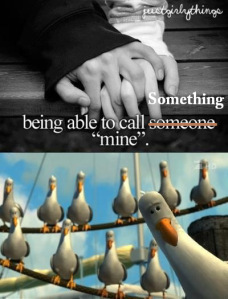
Get it? Cause we’re talking about copyright? Hahahaha… okay.
The biggest fear anyone ever has as a creative mind is: What if someone steals my hard work? This shouldn’t be a problem to even begin with, but in this day and age, it, unfortunately, is. Since deciding I would be an indie-author, I have had to consult many of my lawyer friends and do extensive research on the subject. I’ve heard all kinds of myths and lies being told to authors, though not all with bad intentions in mind. Most are just never given the correct information. Whether you plan on going the traditional route or choosing the independent path, this post is meant to help you answer a few questions and keep you and your work safe based on my own research and after talking with a few of my lawyer buddies.
COPYRIGHT IS INITIATED THE MOMENT IT IS CREATED
The moment you put an idea down on paper, it is yours. You have natural copyright on it, but it’s hard to prove you’re the one to own it without the proper forms. The little copyright symbol in the corner with your name beside it isn’t enough to prove you own anything. You need evidence, and who is better at holding on to and creating evidence than the government and their public record? If the government has it in writing, then you are completely set. You can sue anyone who you think may have stolen your work and you have a much better chance at getting your work back plus any damages where money is concerned. Once again: THE COPYRIGHT SYMBOL MEANS NOTHING UNLESS YOU HAVE SOMETHING TO BACK IT UP. It may deter a few of the amateur criminals, but those who know the business aren’t afraid of it. It’s best just to go on ahead and put a little power behind that symbol rather than to risk someone “testing” the worth of it.
WRITER’S SAY IT DOESN’T HAPPEN – THIS IS NOT THE CASE.
When attending any conference, the question usually comes up, whether in personal interaction or as a large Q and A section: Should I copyright my work before sending it to publishers? The writer’s or representatives will always say, “It never happens,” but in reality, it happens all too often. Publishers want to make money, but it’s hard to make money on someone with an unknown name. It isn’t unheard of for a publisher to reject a work on the grounds of the writer being unknown, then giving the same idea to one of their more well-known authors just for the publicity of it. Sure, the writer could sue, but the burden of proof falls into their hands. If you have nothing to show for your hard work other than a copy on your computer, there is no guarantee you will find any form of compensation and all your work could be lost. Save every email, make copies of everything, and do your best to keep records. There’s no guarantee this will work, but it’s best to go ahead and keep everything in case the need arises.
THE “POOR MAN’S” COPYRIGHT DOES NOT GUARANTEE SAFETY
Not everyone knows it by this title, but it is a well-known and overused process of “self-copyrighting.” Supposedly, if you write up your manuscript, print it off with a mail slip that has the date on it, mail it back to yourself, and put it up somewhere unopened, you have sufficient proof as to your ownership of the idea and story. Though this can help, it does not guarantee a full ownership. The burden of proof is a heavy one, and this form of copyright does not make the burden much lighter – if it does at all. When explaining this process to one of my law friends, he laughed. He literally laughed, and then he proceeded to explain to me the flaw in this process. Sure, the mail slip proves I mailed something on that day to myself, but I could have just mailed an empty envelope and then stuck someone else’s manuscript in there to try and pass it off as my own. If you were suing someone – an average Joe – then you might have a chance, but against a big publisher and a big name in authorship, then this process has little to no chance of working. This is an example of a lie or myth with good intentions. Unless you have sufficient knowledge of law, it would be hard to know whether this actually worked or not. On the outside, it seems legit and makes plenty of sense, but if you look deeper and think like a judge, then this evidence is completely useless.
Now, I did not write this to scare anyone away from traditional publishing or publication in general. I just want everyone to be aware of the possible threats out there. There are bad people who are willing to hurt you to make a quick buck. I want to make sure everyone has the tools necessary to defend themselves before something happens. Better to have prepared for nothing than to have been unprepared for something. Unfortunately, I have no notarized copies of anything my colleagues said, but as I said previously: I did my own research. The most useful page I found is:
He backs up a lot of what my friends have said which I find very reassuring.
But if you don’t feel like going through that page and you trust what I say enough, then here is the link to the copyright form page:
You can either go through the online forms or send in your manuscript through the mail. You may have to do both depending on what is requested of you. There is a fee ranging from $35-$65, but it may be worth the money just to make sure what’s yours stays yours, especially if the work is something very near and dear to your heart. Be sure to check the requirements before you start preparing to send stuff in!
But I would like to address this: not everyone is out to steal your work. There are bad people, but there are good people too. Do your research. There are authors who go their whole lives without a single issue regarding copyright, but make sure you know who you’re giving your work to.
I myself took a pitfall when looking for an editor. A freelance editor, who had plenty of reviews stating his great service, I sent my work to after getting a sample edit took my work and never gave it back. Thankfully, I didn’t have to pay until after the work was done, but now when I look back I should’ve have taken that as a red flag. My book eventually ended up being published in KDP under the editor’s name. With the help of my lawyer friends, I was able to persuade him to take it down. He has since removed his page, though I wouldn’t be surprised if he just changed his name and moved on to a different website. If he had known better, he could have left it up and there would be no way to defend myself because I did not have copyright. Just do your research. Search an editor’s name with the word “scam” to see if you have a reason to worry. Just be careful and keep writing!
Regardless, I hope you enjoyed this article and feel more secure about the process. Have any worries? Drop me a comment! I’m sure I can ask any of my buddies for help. Be sure to check out my links. Both have a decent amount of FAQs on there, so you may find what you need just by heading to those pages.
Happy writing, and thanks for reading!
-Lissy


May 14, 2013
Dealing with (Inevitable) Rejection
We’ve all heard the statistics. J.K. Rowling’s Harry Potter was rejected twelve times before achieving publication, George Orwell was told he would never become an author, etc. That’s all good and humbling for them, but there is a problem when comparing their short-comings to mine: They are now world-renowned and beloved authors. They have written books that will stand the test of time, along with their names and images. I don’t mean to be bitter, but it’s an honest opinion of mine. How is comparing my rejection to that of a best-seller equal?
I originally wrote this post to express my agitation and anger over being rejected, but as I began to write, I realized I was taking a step backward. I could rant as much as I wanted, but it would not change the fact that I was rejected. So, after I cleaned my wounds and bandaged myself up, I decided to make a post dedicated to dealing with and overcoming the pain of rejection.
ADMIT THAT REJECTION IS INEVITABLE
This is something all aspiring writer’s need to realize. When you decide to dedicate your life to writing and publication, there will come a time where you will get rejected. Not every story you write will be accepted by the first agent/publisher/literary journal you send it to. This is a major trial-and-error process. You’ll get it or you won’t, but there is always something to learn from every rejection.
DON’T FEAR A SECOND REJECTION
If you’ve been rejected once, you’ll probably be rejected again, but don’t allow that rejection to completely stun you into a non-writing coma. A rejection is not the end. You have so much more to write, and so many more things to learn.
IF YOU’RE GIVEN FEEDBACK, DON’T THROW IT OUT
Not everyone is this way, but when I find I have been rejected, my immediate reaction is usually anger. If the letter is the run-of-the-mill rejection, I will usually just toss it out and burn it with my gaze from the comfort of my couch. If it has a specialized note on it, for some reason I find that even more offensive and may actually burn it. With fire. But in the end, I realize my anger was for naught. Feedback is hard to come by and is usually there because you were very, very, very close to making it in. Take their feedback as a compliment because chances are, they probably want you to resubmit with the revisions, and the rejection could easily become an acceptance.
YOU’RE A WRITER. BE STUBBORN.
As Jon Stone pointed out to me on Twitter, “sometimes the biggest difference between ‘someone who writes’ and a ‘writer’ is the sheer refusal to take no for an answer.” This single statement motivated me to keep going. He’s completely right. If you truly want to write and become a full-fledged writer, don’t let a single ‘no’ break you to pieces. It may be the first, but it won’t be the last. Get tougher and make sure to keep writing/submitting.
KEEP WRITING. USE YOUR EMOTIONS.
The worst thing you can do to yourself is to stop writing. That’s like punishing yourself for the rejection. You can only get better by continuing to write. The more you write, the better your style will become. The better your style becomes will help with your editing. You will become a much better writer and there will be a better chance at success your next time around. Plus, if you’re angry or hurt, use those emotions to write. Some of my best work came from points in my life where I was in a heightened emotional state. Your own experiences are the best inspiration. Keep writing.
REWRITE AND RESUBMIT.
Just because a particular manuscript gets rejected does not mean it is a terrible story. A lot of the time you will have an intriguing story, but the writing needs some work. Learn from your mistakes. Change some things around. Hire an editor the next time. Get different beta readers. Once you have it in a new and better way, send it off again, but give it time. Don’t submit to the same people right away. Let them have time to move on to other things and give yourself a chance to edit, edit, edit, and edit some more. Make it the best it can be before you send it off again.
THERE IS ALWAYS INDIE PUBLISHING
A disclaimer: This is not an answer to all your problems. No one is guaranteed success in this business. Whether you go the traditional route or self-publish, there is no guarantee. There are lessons to be learned from both, but if time goes on and you find you just can’t seem to get your foot in the door traditionally, try it out. Make sure you do your research and continue to edit. Edit a lot. Then, see where the masses take you and good luck!
I am no expert, and I am hardly a therapist, but I find all of these thoughts comforting or motivating in one way or another. Regardless, as writers we are here to support each other. I, for one, want to make sure I can help all I can in the community because I would want someone to do the same for me. So, if it will make you feel better, I have created a page dedicated to my rejection letters. Check it out here.
Thanks for reading!
-Lissy


May 10, 2013
Keeping Fit as a Writer
Summer is here and my college classes don’t start back until August. The sun is out, the water is warm… And I’m inside, all day, every day, writing and editing. That’s the life of a writer and so be it, but all of this sitting around and writing isn’t good for my health. So, I’ve come up with some ways to stay fit and healthy while you write to your heart’s content.
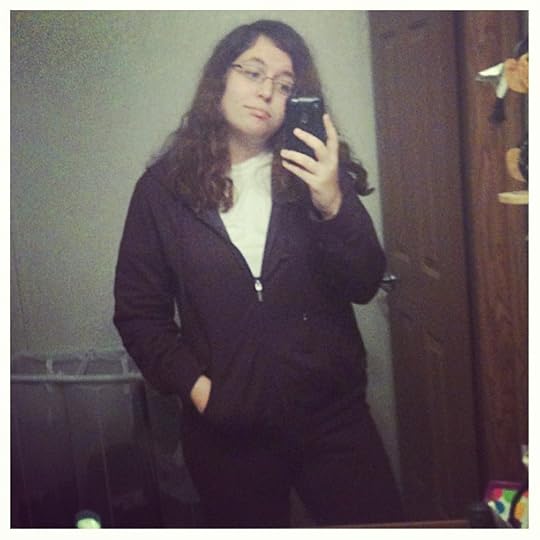
Yes. I have a track suit. I’m not proud of it.
WHEN YOU WRITE, HAVE SMALL SNACKS NEAR
When I get in a major writing mood and I have little to no awareness of my body’s needs, I always keep a small bowl of fruit or a salad nearby. I’ll munch on it throughout the day or just until I get done and can fix myself something to eat. It will keep me from starving myself and I’m not eating a huge, unhealthy meal. Much healthier and it will keep your energy up. More energy = Better thought process. Better thought process = Better writing. This will help your body and your writing.
INVEST IN A TREADMILL OR GO FOR A RUN
If you just want to be active and get some toning-time in for those wonderful writer abs, then I’d invest in a treadmill or go to a gym. While I run, I listen to music with a notebook resting on the front panel. If something strikes me, I can pause it and jot a note down before I get back to my run. If you want to go OUT and run, invest in a small notebook instead and keep it in the waistband of your pants (or in the pocket, but I hardly ever wear anything with pockets for whatever reason). When you think of something, you can stop and jot it down. You’ll be able to have rest breaks and keep productive as far as your writing goes.
GET OUTSIDE AND READ A BOOK
As much as I don’t want to admit it, you need to have a good source of Vitamin D coming in through natural sunlight. I’m pale as a ghost and proud, but I find myself growing lethargic if I go long enough without natural sunlight. With plenty of sunscreen, go out and relax with a book. As a writer, I tend to neglect the fact that I started off as a reader. Support your fellow authors and read their books. It’ll rest your brain from all your hard work and provide a nice escape for a while. You’ll be refreshed and ready to start back on your own writing after you get back in your little batcave. Also, you may learn something from someone’s writing. Grammar gets better from reading. So, sun and grammar. Great combo for my fellow writers.
Not the most exciting read, and I’m far from any professional as far as health and wellness is concerned, but I thought I could share my little process for all those who are in need of a way to incorporate a healthier lifestyle with their writer lifestyle. I hope I helped, and if you have anything to add then please let me know! I’d love to read it and even add it to my list (with proper credit of course). Comment!
Thanks for reading!
-Lissy


May 7, 2013
The Difference between Discipline and Stunting

When my whole life has revolved around one, ONE project for more than a month or two, I go into a type of cruise control. I zone out and just go through the same motions every day. What had once been a beneficial and productive process has become a crutch and nothing gets done anymore.
I would absolutely kill to write something else, but that little voice in my head reminds me, “You have to focus or it will never be perfect!” As a writer, I have always heard that if you stop at any point on the journey to publication that you can hang it up. Chances are you’ll never get back to working on your project because you’ll be too busy working on something else. They always start their claims with analogies about relationships and marriages…
Well, my question is: At what point does this type of discipline become unhealthy for the project and for you?
Discipline is important – no doubt, whatsoever and you want to always write and edit. Every day there should be a time where you dedicate every second to writing or editing, whether it is the entire day or 15 minutes. But why should I have to limit myself to just ONE project? Yes, it’s far from perfect, but the story is finished. It just needs editing. But with all of the monotony of editing and editing and editing, now I can’t even edit as properly as I should.
So, I have developed a completely separate project which is much less labor intensive and can be quick and painless, while also leaving me time to edit my main project. I have found that having a much more minor project alongside a large one is very beneficial to keeping your brain constantly thinking and able to handle the monotony without going into autopilot. Every day, I write at least 1/3 of a short story after editing 1/3 of my large project. I find the work-reward system works very well with my work ethic. I get to relax and still be productive which helps me to prepare for the next round of edits.
Like I said before, it’s great to have focus, dedication, and loyalty to one project, and if you can do it without burning yourself out, then all the power to you and I envy your drive.
For those of us who need a little refresher, but also need to at least do something writing-related then I’d suggest you try out my method or develop your own. Maybe switch around and write the short story first before going back to the project. Write a poem instead. You don’t have to stay completely married to one project. Unlike what most people believe, the relationship between an author and their work is not a marriage. It’s a parent and a child. You will always be dedicated to your first, even if you have another. Doesn’t mean you love it less and you’re not “cheating” like you would if it were your spouse.
At the same time, just because something is new doesn’t mean you should just abandon your first. The oldest ones need just as much attention as the newest creations.
I hope I helped to support someone and let them know they’re not alone. How do you break the monotony? Do you prefer to think of the work as a marriage or a parent-child relationship? Do you ever feel like you need to break out and start something fresh? Comment and let me know!
Thanks for reading!
-Lissy
P.S. If you’d like to see what project I’m talking about, then you can check out my “Current Projects” page at the top of the screen! Feel free to comment here or there! What projects are you working on?


May 6, 2013
5 Confessions of a Writer
As per usual, I was going through my Google+ feed when I came across an interesting blog post by Victoria Grefer (author of the Crimson League series). She addressed a list of confessions she had as a writer which I think every writer should take the time to make. It’s interesting to see what all you think and feel when it comes to things regarding your characters and your own books.

I TEND TO TALK TO MYSELF.
Now, call me crazy, but when I’m preparing to write a big scene involving lots and lots of dialogue I tend to talk to myself. I like to have the conversations out loud so I can hear how realistic and in-character they sound. If it sounds too false or doesn’t fit in with the character who is speaking, I change it or take it out. It seems to have become habit because now I do it in public places if I’m brain-storming, but can’t actually write it down. :shrug:
ALL OF MY CHARACTERS ARE BASED OFF REAL PEOPLE.
I may have talked to them once, passed them on the street, eavesdropped into one of their conversations, or they could be my friends and family. Either way, I have seen or met every character I have ever written. This can be troublesome when involving friends and family because if they are my beta readers, they can usually figure out right away who their character is. It only gets worse when something bad happens to that character and they assume it’s because I want to punish them for something. I would be lying if I said this wasn’t true sometimes, but most of the time it is just a natural course of the plotline. No hard feelings – maybe.
I AM VERY, VERY, VERY PROTECTIVE OVER MY CHARACTERS.
Because they are real people to me, I feel like I should protect them. It’s strange and I’m sure I should have gone to a therapist about it a long, long time ago, but it’s true. It hurts to put them through bad situations, and I especially don’t like when people focus solely on a character and rip them apart. I take it gracefully, but I also take it to heart. :shrug: That’s the pain of basing characters off people you know and love, it can come back to bite you.
I LOVE ADVERBS. IT’S A CURSE.
For whatever reason, in my first draft I find that every two sentences have at least one adverb in them. Most of my editing involves going through and removing every unnecessary adverb I can find (which is usually all of them). Adverbs can be a writer’s worst enemy if you don’t watch out. They just seem to… sneak in… They work and weave their ways into my words, sentences, and paragraphs. Infiltrating and adding to the wordiness… This is probably another reason I should go see a therapist. :shrug:
A MAJORITY OF MY STORIES STARTED OFF AS FANFICTIONS.
It’s no mystery that I am a self-proclaimed nerd. I love anime, Doctor Who, etc… so, I tend to be influenced by them a lot more than real world events. Thus, a lot of what I write tends to start out as fanfiction. I used to post them all the time and that was my main source of writing material. Eventually, I would find my fanfictions just gathering dust amongst the vast interwebs. It wasn’t long before I realized just by changing a few of the names and details, the work would become a completely independent and original piece. Thankfully, most of my fictions never truly resided in the worlds that they were based on so it wasn’t hard to make the switch, but it was a great tool to utilize and get some writing going.
Well, that is a good chunk of my writing life. As writers I am sure we all have similar feelings (and psychological issues), but I would like to read some of yours! Comment and let me know!
Thanks for reading!
-Lissy


May 4, 2013
My Editing Technique
Just recently I have been playing around with editing techniques. I had been told that to be a decent writer you have to be a pretty good editor, and with the recent emphasis on my short story collection, editing has been my main focus.
Another good tidbit I had been given awhile back was that you should always read your work out loud which I am a major advocate of, but while doing so I began to wonder how editing would work when listening to yourself. You are listening to yourself as you’re reading it out loud, but how about as a mock audiobook or recorded speech? I always find myself picking up on things better when I listen to them in a sort of podcast format. Plus, when reading straight off the page (or the screen), I’m still focusing heavily on the words in front of me and not on how they sound. So, I have developed my own kind of editing process which I’d like to share today.

First, a minor disclaimer: I am no professional editor. This may work for you, but there’s also a good chance it may not. Just find the technique that works best for you and run with it. I have found this is the best technique for me because of the particular style I want to achieve. Regardless, here is my process:
DO YOUR REGULAR READING FIRST
To catch all of my initial mistakes or minor word slips, I read straight off the page like I normally would. I change any mistake immediately and once it’s been fixed, I continue on with my regular reading. Sometimes I will do this a couple times just to ensure it reads off the page better, but one time is usually sufficient.
READ THE NEW DOCUMENT AGAIN, THIS TIME WHILE RECORDING
Now, depending on your own preference, you can use special audio recording equipment or the plain-Jane audio equipment that came with your computer. I use my TekNMotion headphones. They’re cheap and of decent quality. Plus, they’re great for online gaming or vlogging, which is the initial reason I got them. Regardless, I reread the draft. I make sure to pause between paragraphs. This helps with my editing later on. DO NOT EDIT DURING THIS STAGE. Even if I find something during the read through, I leave it alone. I fix it in the next step. I don’t add in anything either, even if I think something would sound better. I just make a small reminder and keep on with the recording.
LISTEN TO THE RECORDING WITH YOUR DOCUMENT IN-HAND (OR ON-SCREEN)
When I listen to my recording, I mark down changes for each individual paragraph, which I indicate by a somewhat lengthy pause. At that point, I edit anything I find that sounds strange or could be substituted. If I made a note during the recording, I edit it in. Once I do an initial change, I DO NOT REREAD THE PARAGRAPH. I accept my changes and keep going. I repeat the process with each paragraph until I have done all of my piece.
REPEAT
Once I have done my first set of revisions, I re-record myself reading the new draft with all of my new edits. Once again, I avoid making changes, but make little reminders instead. Then, I re-listen to it and edit as I go. The process can be repeated as many times as necessary until I am pleased with the outcome.
This process is very beneficial when learning how to make sentences and paragraphs flow together. If you feel like you have re-oriented yourself to read the next sentence or the next paragraph, you may need to work on your transitions. This can also help with developing a better speaking voice. On the plus side, it’s always really cool to hear your work being read out loud like it’s an audiobook. Give it a try and let me know how it worked for you!
Thanks for reading!
-Lissy


May 1, 2013
Writing Mediums
In all honesty, how much thought do you put in to the tools with which you write? Have you ever switched around with the different types there are out there?
I have actually tried most of them, and I put them into three categories:
- Pen and Paper
- Computer
- Specialty Mediums ( Typewriters, Alphasmart Word Processors etc. )
Now, depending on your preference, some of these will not be to your liking, and I have found that when you are dissatisfied with your materials your creativity can sometimes be stunted. That’s why it is best to try as many as you can until you find one that works best with your needs. In some cases, you may be able to switch from one to the other with not much change but you may also find that switching can lead to a much more productive result, and that’s what we want. We want a productive medium!
Let’s start off with the traditional pen and paper (I am biased since this is my choice medium, but I will do my best to keep it fair):
Pros
Cheap
Customizable
Portable
Little Distractions
No Upgrading Required (Unless you upgrade paper quality or writing utensil, i.e. pencil to pen or vice versa)
Simple
No Power Source
Cons
Handwriting/Utensil Issues
Hard to Edit
Not Easily Transferable
No Word Count
Limited Storage
Multiple Notebooks for Extra Storage
Non-Environmental
Limited Formatting
Computers:
Pros
Quick Editing
Proofreader
Word Count
Large Amount of Storage
Formatting
Easily Transferable
Can be Portable
Environmentally Friendly
Cons
Distracting
Expensive
Requires Power Source
May Require Upgrading
May Not be Portable
Special Medium ( I will focus on Alphasmart, as typewriters tend to be a mix of computers and traditional, and not many people know about the Alphasmart products ):
Pros
Cheap
No Distraction
Word Count
Lengthy Battery Power
Portable
Proofreader
Transferable
Cons
Requires Upgrading
Hard to Transfer
Still Requires Power Source
No Formatting
Limited Memory
Very Old Technology
Now, some of this was apparent from the beginning but I wanted to prepare a list to compare with the Alphasmart since not many know about them. They really are quite useful, but they weren’t my favorite.
The materials used are major to the result of the product, and you want to make sure you have the right tools, but that’s not to say you can only use one. In some cases, it’s best to use multiple ones for editing. A new medium tends to help you notice things you wouldn’t have in your choice medium. I hope I have helped or interested someone. If you have anything to add or perhaps you have another medium you think should be added, feel free to let me know.
Thank you for reading!
-Lissy


Alyssa Hubbard's Blog
- Alyssa Hubbard's profile
- 22 followers


